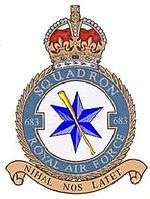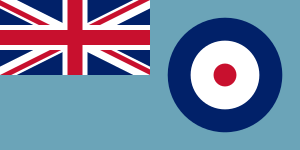No. 683 Squadron RAF
No. 683 Squadron RAF was a photo-reconnaissance squadron of the Royal Air Force during the Second World War.
| No. 683 Squadron RAF | |
|---|---|
 | |
| Active | 8 Feb 1943 – 21 Sep 1945 1 Aug 1950 – 30 Nov 1953 |
| Country | |
| Branch | |
| Role | photo-reconnaissance squadron |
| Part of | AHQ Malta, Mediterranean Air Command[1] No. 214 Group RAF, Mediterranean Air Command[2] RAF Middle East Air Force[3] |
| Motto(s) | Latin: Nihil Nos Latet (Translation: "Nothing remains concealed")[4][5] |
| Insignia | |
| Squadron Badge heraldry | In front of a mullet of six points, a telescope in bend[4][5] |
| Squadron Codes | No code(s) are known to have been carried by this squadron[4][6][7] |
History
Formation and World War II
683 squadron was formed out of 'B' Flight of No. 69 Squadron on 8 February 1943[4][5][8] at RAF Luqa on Malta, as a photo-reconnaissance squadron operating the Spitfire fighter in the photo-reconnaissance role. The squadron added the Mosquito Mk.VI to its strength in May 1943, but they were only operated for a month. The squadron was involved in photo-reconnaissance mission over Sicily and Italy and later over Yugoslavia. The squadron moved to San Severo in Italy and continued in support of the US 5th Army. As the war continued it was involved in both tactical and strategic reconnaissance, and was involved survey flight across southern Europe. In September 1944, the squadron re-equipped with Spitfire PR.XIX photo-reconnaissance aircraft. Detachments from the squadron were based at a wide range of bases all across the Italian theatre of operations, with the squadron finally disbanding on 22 September 1945 at San Severo, Italy.[4][5][8]
Post war
The squadron was re-formed on 1 November 1950 at RAF Fayid, Egypt with the Avro Lancaster PR.1 and the Vickers Valetta C.1. It was tasked with the survey and mapping of Arabia and East Africa. In January 1952 the squadron moved to RAF Khormaksar, Aden to cover both Aden and Somaliland. Another move to RAF Habbaniya, Iraq allowed the squadron to survey and map the Persian Gulf. With the survey and mapping role completed the squadron was disbanded at Habbaniya on 30 November 1953.[4][5][8]
Aircraft operated
| From | To | Aircraft | Variant |
|---|---|---|---|
| February 1943 | July 1943 | Supermarine Spitfire | PR.Mk.IV |
| February 1943 | March 1943 | Supermarine Spitfire | PR.Mk.IX |
| April 1943 | September 1945 | Supermarine Spitfire | PR.XI |
| May 1943 | June 1943 | de Havilland Mosquito | PR.Mks.IV & VI |
| September 1944 | September 1945 | Supermarine Spitfire | PR.XIX |
| November 1950 | November 1953 | Avro Lancaster | PR.1 |
| November 1950 | November 1953 | Vickers Valetta | C.1 |
Squadron bases
| From | To | Base | Remark |
|---|---|---|---|
| 8 February 1943 | 22 November 1943 | RAF Luqa, Malta | |
| 22 November 1943 | 20 December 1943 | RAF El Aouina, Tunisia | |
| 20 December 1943 | 21 September 1945 | RAF San Severo, Italy | Dets. all over Italy |
| 1 August 1950 | 26 February 1951 | RAF Fayid, Egypt | |
| 26 February 1951 | 23 April 1951 | RAF Kabrit, Egypt | |
| 23 April 1951 | 24 September 1951 | RAF Eastleigh, Kenya | Dets. at Livingstone, Northern Rhodesia and Dar-es-Salaam, Tanganyika |
| 24 September 1951 | 12 December 1951 | RAF Kabrit, Egypt | Det. at RAF Shaibah, Iraq |
| 12 December 1951 | 22 May 1952 | RAF Khormaksar, Aden | Det. at RAF Habbaniya, Iraq |
| 22 May 1952 | 30 November 1953 | RAF Habbaniya, Iraq | Det. at RAF Sharjah, Trucial States |
Commanding officers
| From | To | Name |
|---|---|---|
| February 1943 | October 1943 | W/Cdr. A. Warburton, DSO and Bar, DFC and Bar |
| October 1943 | August 1944 | S/Ldr. H.S. Smith, DFC |
| August 1944 | April 1945 | S/Ldr. R.T. Turton, DFC |
| April 1945 | September 1945 | S/Ldr. E.R. Pearson, DFC |
| November 1950 | 1952 | S/Ldr. I.D.N. Lawson |
| 1952 | November 1953 | S/Ldr. N.N. Ezekiel |
References
Notes
- Delve 1994, p. 67.
- Delve 1994, p. 75.
- Delve 1994, p. 87.
- Rawlings 1982, p. 246.
- Halley 1988, p. 455.
- Bowyer and Rawlings 1979, p. 148.
- Flintham and Thomas 2003, p. 233.
- Jefford 2001, p. 105.
Bibliography
- Bowman, Martin. Mosquito Photo-Reconnaissance Units of World War 2. Oxford, UK: Osprey Publishing, 1999. ISBN 1-85532-891-7.
- Bowyer, Chaz. Mosquito Squadrons of the Royal Air Force. London: Ian Allan Ltd., 1984. ISBN 0-7110-1425-6.
- Bowyer, Michael J.F. and John D.R. Rawlings. Squadron Codes, 1937–56. Cambridge, UK: Patrick Stephens Ltd., 1979. ISBN 0-85059-364-6.
- Delve, Ken. The Source Book of the RAF. Shrewsbury, Shropshire, UK: Airlife Publishing, 1994. ISBN 1-85310-451-5.
- Flintham, Vic and Andrew Thomas. Combat Codes: A full explanation and listing of British, Commonwealth and Allied air force unit codes since 1938. Shrewsbury, Shropshire, UK: Airlife Publishing Ltd., 2003. ISBN 1-84037-281-8.
- Halley, James J. The Squadrons of the Royal Air Force & Commonwealth, 1918–88. Tonbridge, Kent, UK: Air-Britain (Historians) Ltd., 1988. ISBN 0-85130-164-9.
- Jefford, C.G. RAF Squadrons, a Comprehensive Record of the Movement and Equipment of all RAF Squadrons and their Antecedents since 1912. Shrewsbury, Shropshire, UK: Airlife Publishing, 2001. ISBN 1-84037-141-2.
- Rawlings, John D.R. Coastal, Support and Special Squadrons of the RAF and their Aircraft. London: Jane's Publishing Company Ltd., 1982. ISBN 0-7106-0187-5.
